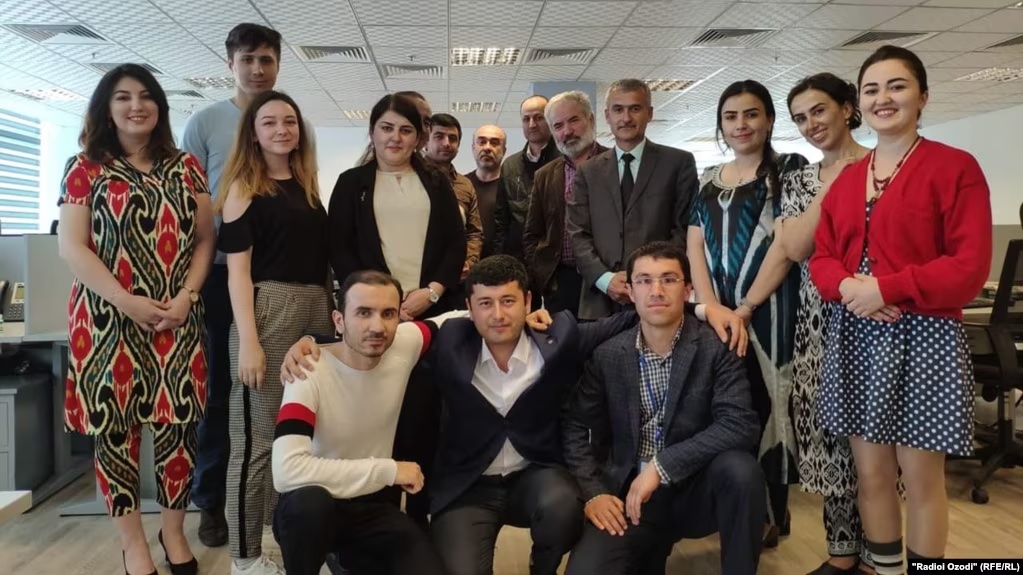Tajikistan Again Fails To Fully Accredit RFE/RL Journalists
RFE/RL President Jamie Fly has told Tajikistan’s top diplomat that his government has failed to honor its commitments, and that RFE/RL may have to consider alternatives to its current operations as a result.

WASHINGTON, D.C. — In the latest development in a protracted effort by Radio Free Europe/Radio Liberty (RFE/RL) to accredit its journalists in Tajikistan, RFE/RL President Jamie Fly has told the country’s top diplomat that his government has failed to honor its commitments, and that RFE/RL may have to consider alternatives to its current operations as a result.
Fly’s statement was conveyed in a letter to Tajik Foreign Minister Sirojiddin Muhriddin on January 21. That morning, the ministry granted six-month accreditations to four members of RFE/RL’s Tajik Service, known locally as Radio Ozodi. This falls far short of the year-long accreditations mandated by Tajik law, and does not address the circumstances of seven Ozodi correspondents who remain without credentials and unable to legally perform their journalistic work, or another seven who were granted partial accreditations in October 2019.
“These partial accreditations, together with the continued harassment of Ozodi colleagues, fail to demonstrate your government’s sincerity to allow Radio Ozodi to function unimpeded,” and to “fulfill Tajikistan’s international obligations to respect independent media,” Fly wrote.
Fly also referenced a meeting with the minister in Zurich on November 7, in which he explained that the “withholding of accreditation from our journalists, for months and in one case for two years, constitutes censorship, a violation of Tajik law, and a threat of sufficient proportions as to prompt us to consider closing the bureau in Dushanbe.”
He ended the letter urging that the remaining accreditations be granted immediately.
Fly had delivered a similar message during the same Zurich visit to Tajik President Emomali Rahmon, telling him that RFE/RL could not accept the selective or short-term accreditation of its journalists and, if necessary, would review its operations in Tajikistan. President Rahmon told Fly that he wanted Ozodi to remain in the country.
The limited credentials come as Tajikistan heads into a year with both parliamentary and presidential elections.
Tajik law requires foreign journalists – as well as their drivers and support staff — to be credentialed by the Foreign Ministry on an annual basis. At the same time, as Tajikistan’s National Media Council and National Association of Independent Media have pointed out, the law guarantees that “foreign correspondents have the right to the free transfer” of information, “excluding any censorship.”
The OSCE, The Washington Post, the Committee to Protect Journalists, Human Rights Watch, and local Tajik media advocacy groups have decried the government’s withholding of accreditation as a violation of media freedom and a means of censorship. Members of the U.S. Senate and House of Representatives sent letters to the Tajik president criticizing the use of accreditation to restrict Radio Ozodi’s independent reporting, and stating that a failure to allow RFE/RL to operate freely could affect U.S.-Tajik relations.
RFE/RL’s Tajik Service, operating out of a bureau in Dushanbe, is one of the country’s few remaining sources of independent news, attracting outsized audiences with compelling reporting on issues not otherwise covered by state-run media. It has Tajikistan’s most popular YouTube channel (897,000 subscribers; 195 million video views in FY2019) and Facebook page (191,000 followers; 14 million video views in FY2019).
For more information, contact press@rferl.org.
###
About RFE/RL
Radio Free Europe/Radio Liberty (RFE/RL) is a private, independent international news organization whose programs — radio, Internet, television, and mobile — reach influential audiences in 23 countries, including Russia, Ukraine, Iran, Afghanistan, Pakistan, the republics of Central Asia and the Caucasus. It is funded by the U.S. Congress through USAGM.